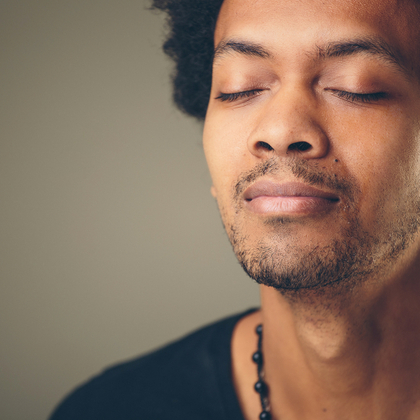
It’s widely accepted that regular exercise – and even short bursts of movement – are important for healthy sleep hygiene. While all physical activity is beneficial, yoga is uniquely equipped to prepare the body and mind for rest. In a recent survey, over 55% of practitioners agreed that yoga positively impacted their sleep1.
Rooted in Indian philosophy, the ancient practice of yoga combines meditation and conscious breathing with movement. This activity is celebrated for its positive effects on physical and emotional wellbeing and is often used for stress relief, anxiety management, muscle pain, and, increasingly, sleep2.
In this article, we explore the fascinating relationship between yoga and sleep.
How does exercise affect sleep?
Regular exercise is understood to be one of the most important pillars of health, reducing the risk of chronic diseases, improving physical function, and leading to a higher quality of life. And for many people, the biological responses to exercise also support sleep.
Perhaps the most apparent way movement facilitates sleep is that it physically exhausts the body. Evidence suggests exercise – most specifically, moderate to intense activity – contributes to more restful sleep by reducing the time it takes to fall asleep (sleep onset) 3.
Additionally, exercise aids sleep by raising your core body temperature4. After around 30 to 90 minutes, your core temperature begins to drops – and this decline naturally promotes sleepiness.
Exercise also indirectly affects sleep by safeguarding your emotional and mental health. Regular exercise has been linked to a reduction in stress and anxiety, both of which commonly disrupt sleep5.
Reassuringly, you don’t need to train for a marathon to improve your sleep. Experts generally point to 30 minutes of moderate activity most days of the week to see a change in your sleep hygiene.6
Yoga and sleep: what’s the connection?
Yoga combines all of the benefits of regular exercise with conscious breathing, mediation, and mindfulness, making it a powerful tool for sleep.
Not surprisingly, numerous studies have reported that yoga improves specific sleep disorders, such as insomnia7. More specifically, findings suggest yoga may be beneficial for postmenopausal women who experience insomnia8.
Mindfulness meditation is at the heart of yoga – and that’s why many practitioners often refer to it as a ‘moving mediation’. This practice aims to cultivate present-focused awareness without judgment. Mindfulness is known to increase levels of the sleep hormone melatonin and even reduce night-time arousals9.This foundational element of yoga may also ease anxiety, stress, and low mood, which often interfere with sleep10.
Conscious breathing is equally fundamental to the practice. Yogic breathing is also referred to as ‘Ujjayi Breathing’ – or Ocean Breathing –, which is characterised by inhaling deeply through your nose and while constricting the back of your throat. The combination of deep breathing and present-focused awareness calms the nervous system, quiets the mind, and relaxes the body, which helps prepare you for sleep.
Is it bad to exercise then sleep?
Exercising in the hours before sleep has long been discouraged. The traditional school of thought suggests that vigorous exercise raises core body temperature, heart rate, and adrenaline and cortisol levels, which aren’t conducive to sleep11. Therefore, many experts have believed, for years, that exercise should be avoided in the three-hour window before bed.
And yet, new findings suggest that it’s still possible to enjoy exercise close to bedtime without disrupting your sleep. One study reported that individuals who exercised at 8 pm still fell asleep quickly, achieved healthy levels of deep sleep, and woke refreshed12.
A 2019 systematic review yielded similar results. The analysis concluded that evening workouts could actually improve sleep, granted the activity is moderate and completed at least one hour before bed13.
For most people, moderate-intensity activity doesn’t seem to affect sleep as long as it’s completed around 60-90-minutes before bed, which gives enough time for the core temperature and endorphins to return to a healthy level needed for rest14. But listen to your body. Everyone is different. The most important thing is exercising regularly, whenever works for you.
If you decide to fit in a late-night workout, an excellent way to regulate your core body temperature post-exercise is by having a hot bath or shower just before bed. This will encourage the blood to come to the skin's surface, act as a thermal radiator, and take the heat out of your core. As a result, your core temperature drops, and you will fall asleep easier.
What types of yoga support sleep?
Not all yoga is created equal. Some are styles are much more vigorous than others. Generally speaking, it’s wise to limit any high-intensity yoga, such as Vinyasa, Ashtanga, or hot yoga, to the morning or afternoon. These classes will still facilitate sleep when performed at least a few hours before bed, but they may delay sleep onset if practised in the hour before bed.
If you want to enjoy yoga nearer bedtime, we recommend a slower, gentler style.
Hatha yoga
Hatha yoga consists of a range of relaxing breathing techniques and gentle asanas (postures), helping prime the body and mind for sleep15.
Yoga Nidra
Yoga Nidra – also known as ‘effortless relaxation’ or ‘yogic sleep’ – comprises a guided meditation and conscious relaxation16. It’s usually practised lying down in ‘corpse pose’, making it especially conducive to rest.
Yin yoga
Yin yoga is a therapeutic, slow-paced style of yoga focusing on long-held poses that target your deep connective tissues and calm the nervous system.
It’s a well-established fact that regular exercise in an essential part of healthy sleep hygiene. And it’s increasingly apparent that yoga and sleep, in particular, have a unique relationship. So, if you’re looking for another way to improve your sleep quality and quantity, you may wish to add this practice to your arsenal.
For more information on sleep, please visit our dedicated Sleep Health Hub.
References:
- Bankar. M.A., Chaudhari. S.K. & Chaudhari. K.D. (2013). Impact of long term Yoga practice on sleep quality and quality of life in the elderly. Journal of Ayurveda and integrative medicine. 4(1), 28–32.
- Nccih.nih.gov. 2021. [ONLINE] Available at: https://www.nccih.nih.gov/health/yoga-what-you-need-to-know
- Dolezal, B. A., Neufeld, E. V., Boland, D. M., Martin, J. L., & Cooper, C. B. (2017). Interrelationship between Sleep and Exercise: A Systematic Review. Advances in preventive medicine, 2017, 1364387.
- Dolezal, B. A., Neufeld, E. V., Boland, D. M., Martin, J. L., & Cooper, C. B. (2017). Interrelationship between Sleep and Exercise: A Systematic Review. Advances in preventive medicine, 2017, 1364387.
- Callaghan P. (2004) Exercise: a neglected intervention in mental health care? J Psychiatr Ment Health Nurs. 11(4), 476-83.
- 2021. Exercising for Better Sleep. [ONLINE] Available at: https://www.hopkinsmedicine.org/health/wellness-and-prevention/exercising-for-better-sleep
- Wang, W. L., Chen, K. H., Pan, Y. C., Yang, S. N., & Chan, Y. Y. (2020). The effect of yoga on sleep quality and insomnia in women with sleep problems: a systematic review and meta-analysis. BMC psychiatry, 20(1), 195.
- Afonso RF, Hachul H, Kozasa EH, Oliveira Dde S, Goto V, Rodrigues D, Tufik S, Leite JR. (2012) Yoga decreases insomnia in postmenopausal women: a randomized clinical trial. Menopause. 19(2),186-93.
- Zeichner, S. B., Zeichner, R. L., Gogineni, K., Shatil, S., & Ioachimescu, O. (2017). Cognitive Behavioral Therapy for Insomnia, Mindfulness, and Yoga in Patients With Breast Cancer with Sleep Disturbance: A Literature Review. Breast cancer : basic and clinical research, 11, 1178223417745564.
- Goyal, M., Singh, S., Sibinga, E., Gould, N., Rowland-Seymour, A., Sharma, R., Berger, Z., Sleicher, D., Maron, D., Shihab, H., Ranasinghe, P., Linn, S., Saha, S., Bass, E., Haythornthwaite, J. and Cramer, H., 2014. Meditation Programs for Psychological Stress and Well-being: A Systematic Review and Meta-analysis. Deutsche Zeitschrift für Akupunktur, 57(3), 26-27.
- Souissi, M., Chtourou, H., Zrane, A., Cheikh, R., Dogui, M., Tabka, Z. and Souissi, N., 2012. Effect of time-of-day of aerobic maximal exercise on the sleep quality of trained subjects. Biological Rhythm Research, 43(3), 323-330.
- Youngstedt, S. D., & Kline, C. E. (2006). Epidemiology of exercise and sleep. Sleep and biological rhythms, 4(3), 215–221.
- Stutz J, Eiholzer R, Spengler CM. (2019) Effects of Evening Exercise on Sleep in Healthy Participants: A Systematic Review and Meta-Analysis. Sports Med. 49(2): 269-287.
- Miller DJ, Sargent C, Roach GD, Scanlan AT, Vincent GE, Lastella M. (2020) Moderate-intensity exercise performed in the evening does not impair sleep in healthy males. Eur J Sport Sci. 20(1): 80-89.
- Woodyard C. (2011). Exploring the therapeutic effects of yoga and its ability to increase quality of life. International journal of yoga, 4(2), 49–54.
- Moszeik, E.N., von Oertzen, T. & Renner, KH. Effectiveness of a short Yoga Nidra meditation on stress, sleep, and well-being in a large and diverse sample. Curr Psychol (2020).
Related Posts

Olivia
Olivia Salter has always been an avid health nut. After graduating from the University of Bristol, she began working for a nutritional consultancy where she discovered her passion for all things wellness-related. There, she executed much of the company’s content marketing strategy and found her niche in health writing, publishing articles in Women’s Health, Mind Body Green, Thrive and Psychologies.
View More



